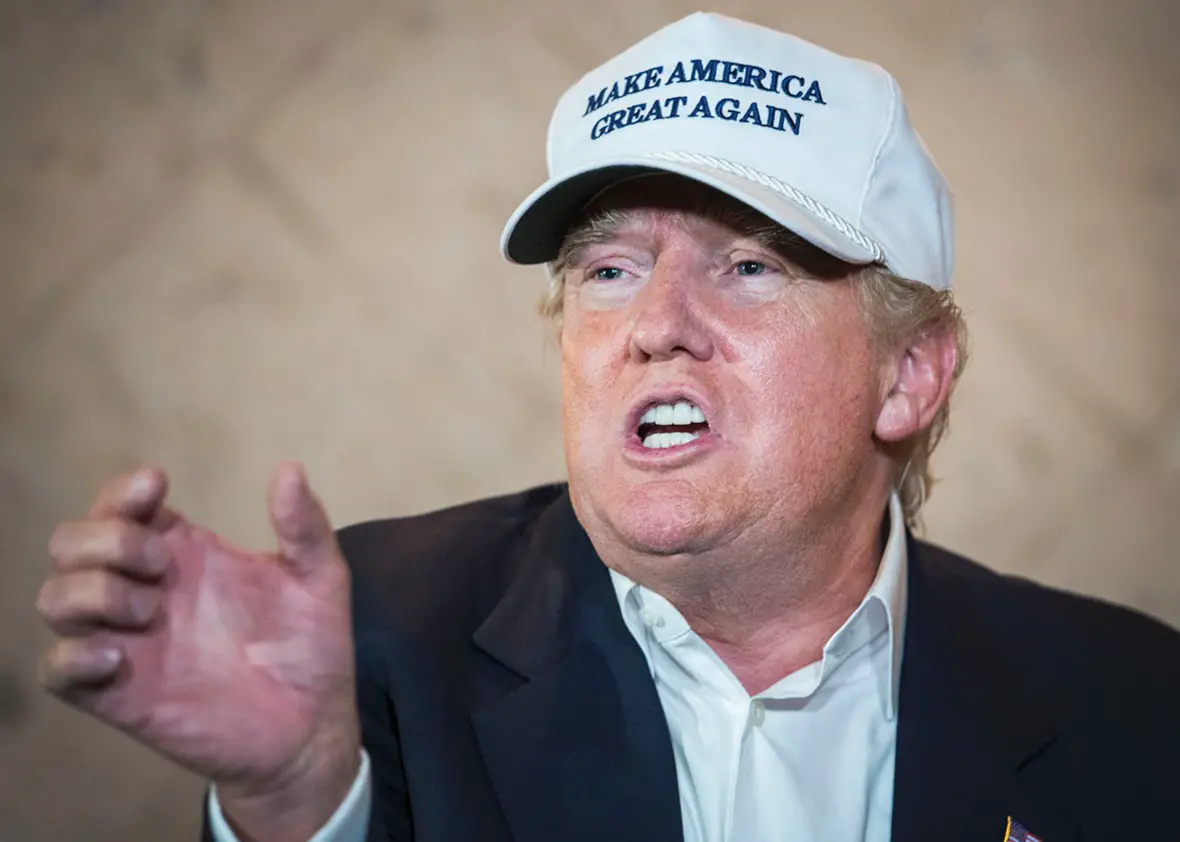Make Donald Trump Think of a New Slogan
Exactly what point in time does he want to go back to?
By Danny Enjamio, Santa Fe College
“For me, I would say the turning point for our country was 1913,” answered a white-haired gentleman in a clip from “The Daily Show.”
The respondent’s specificity seemed odd, as if he’d either been preparing for that question for quite some time, or just threw out the first year that came to mind. Unfortunately, he wasn’t searching for the right answer, because the question has no right answer. What the hapless interviewee was really hoping for was an answer that would incite as little backlash from the interviewer as possible.
The gentleman, who was wearing a button with Donald Trump’s smiling face on it, was asked when exactly he thought America was last great. For some reason he chose 1913, to which “The Daily Show” correspondent responded, “So, like, back when women couldn’t vote?”
The man was one of several people who looked foolish after being surveyed by reporters from the news satire as it covered the Republican National Convention. The show’s bit was an attempt to poke fun at unsuspecting voters by exposing the absurdity of Donald Trump’s “Make America Great Again” slogan, or at least to arrive at a better understanding of the statement that Americans find either reassuring or frightening.
Forget how you feel about Trump’s personality or politics though, because the purpose of this article is neither to condemn nor persuade. No, this is about Donald Trump’s campaign promise from the perspective of a young voter.
A slogan usually shouldn’t be taken too seriously. After all, the phrase “I’m loving it” doesn’t factor in to how much you enjoy McDonald’s, and likewise political slogans shouldn’t make much difference when choosing the candidate you believe should be president.
But then again, nothing associated with Donald Trump’s campaign is conventional. “Make America Great Again” isn’t just an innocuous phrase to put on crappy hats, but rather a synopsis of what makes his potential presidency appealing to some and dangerous to others.
I assume the Republican nominee wants this phrase to be uttered and analyzed constantly, since it seems as though he wants me to vote for him on that basis alone.
For example, according to an advisor of John Kasich, Donald Trump Jr. reached out to him in order to gauge the Ohio governor’s interest in becoming his father’s running mate, a role he said would put him in charge of both domestic and foreign policy. When asked what exactly Trump would be in charge of, his son reportedly replied, “Making America great again.”
So what does that even mean? And when exactly does Trump believe America was great and stopped being so?
“Great,” of course, represents a relative term. To suggest America must be made great again means you believe it was somehow more similar to your definition of great in the past than it is today.
Just to be clear, believing America isn’t great currently isn’t so bad; it’s the “again” portion of Trump’s empty promise that warrants objection.
What made our country great in the past isn’t lost today, and can’t be quantified through winning and losing as it pertains to wars or the economy or anything else. That kind of success is fluid and depends greatly on outward circumstances. America is great regardless of such success or failures. It is great because of a commitment to values and rights assured by the country’s founding fathers, values even they themselves didn’t always live up to.
What “The Daily Show” interview exposes is just how flawed Trump’s campaign pledge is, as you could point to any time in American history and explain why our country wasn’t so great then, or at least no greater than it is currently.
See, even if you believe America was somehow greater in the past, it wasn’t because of one person, and if it was it certainly wasn’t because of a president.
“Beginning on January 20th 2017, safety will be restored,” Trump said during his RNC speech, as if the mere presence of any president in American history made the country safer. But Trump doesn’t exactly come across as somebody who understands American history.
I say that because he’s the same person that responded to the deaths of police officers in Dallas and the killings of Alton Sterling and Philando Castile by saying he “will make America safe again,” an asinine statement to accompany those particular tragedies.
I’d love to know in what year Trump believes this country was safer for Americans like Castile and Sterling.
Maybe Trump wants America to be more like it was in the 1960s and early 70s, when his real estate company was able to deny apartments to black people without having to worry about those housing discrimination lawsuits. Or maybe the 1980s, when Trump paid undocumented Polish immigrants for a project he needed done quickly, something he was found guilty of in 1992 and an odd move for somebody so concerned with illegal immigrants today.
Man, those were the days!
This country has problems today, just like it did four and eight years ago, just like it will again in four and eight years. So if America’s greatness for you somehow depends on the current state of the economy, then you’ll surely be disappointed.
But if you’re like me, you believe America’s greatness has always been the result of looking ahead and going forward. The founding fathers did not give us a perfect nation; they gave us a perfectible nation.
The real question, then, is not when was America last great. The real question—the real challenge—is to understand how we can make it greater.









